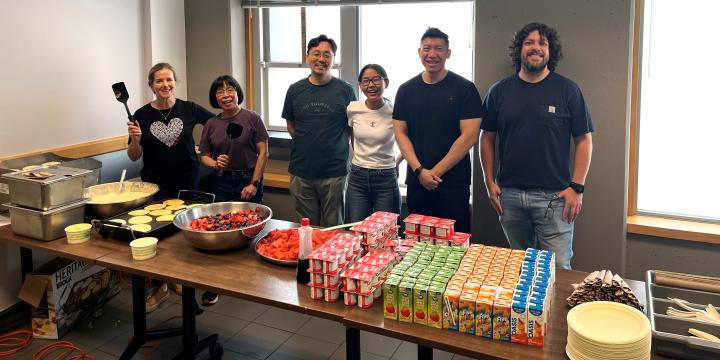
For YWCA Employment Counsellor Peter Fisher, being a hands-on dad was never a question—his own father was the same, despite working two jobs—and he hopes his two sons, Traben and Jonah, will remember if they have kids one day.
“By being a caring father and modeling my own self-care, my relationship with my wife, with the planet and with our community, my hope is that some of that rubs off on them,” says Peter.
Studies show that it does. Compared to children with less involved fathers, kids with engaged, loving dads have higher levels of psychological well-being, are more empathetic and socially competent and have better educational and economic outcomes.
A 2014 UBC study published in Psychological Science also found that fathers who help out around the house are more likely to raise daughters who aspire to less traditional, and potentially higher paying, careers.
And it is not just children who benefit from increased paternal involvement. We know that when dads play an active role in parenting and household work, it is good for the family and for the fathers themselves.
Dutiful dads are satisfied dads
Canadian dads are more engaged in family life than ever before. In 2011, 12% of dads from two-parent families stayed home with the kids while their partners earned the family income, up from just 1% in 1976. More Canadian men are also taking parental leave: 13% in 2011 compared to 9% in 2004.
 Peter spent two years as a stay-at-home dad when his youngest son, Jonah, was still a toddler. He says it was the happiest time of his life because he was able to strengthen his relationships with his kids while supporting his wife, Linda, in her career development.
Peter spent two years as a stay-at-home dad when his youngest son, Jonah, was still a toddler. He says it was the happiest time of his life because he was able to strengthen his relationships with his kids while supporting his wife, Linda, in her career development.
Working dads also benefit from increased paternal involvement. According to a 2014 study published in the Academy of Management Perspectives, fathers feel greater job satisfaction and less work-life conflict when they spend more time caring for their children.
Has Peter’s involved approach made a difference? He believes it has. He says that both of his sons have “high EQ” or emotional intelligence, though is quick to credit both parents for this.
“We’ll get stopped by people who say, ‘Your boys are so wonderful,’” says Peter. “It’s the thing we’re most proud of. We’re by no means perfect, but we’ve tried to model the importance of equality in our own relationship, and to bring our boys up to value diversity and inclusivity.”
Helping moms lean in
Engaged dads also reduce the caregiving and household workload for moms, while increasing the family’s overall parenting capacity. Studies show that paternal support gives women a more positive outlook on motherhood, and increases their capacity to achieve their own personal and professional goals.
“We have always supported each other fully, and after 20 years of marriage it has really become a synergistic relationship,” says Peter.
Unfortunately, this is not the case for many North American families. A 2007 University of California Berkley study of professional women who had left the paid workforce, reported that 60 percent cited their husbands as a critical factor in their decision, specifically indicating their husband’s lack of participation in child care and other household tasks and the expectation that mothers should be the ones to cut back on employment.
Even when both parents work full-time, working moms often end up doing more housework than working dads, increasing their sense of work-life conflict. When women leave their jobs it means the workforce as a whole misses out on their full potential, and can set working mothers up for a lifetime of lower earnings.
So how do we ensure dads like Peter become the norm in Canada?
Supporting dads to play an active role
At the YWCA, we advocate for smart family policies that address the imbalance in unpaid care, like flexible working arrangements and parental leave reforms that encourage men to play a stronger role at home.
In Quebec, where dads receive five weeks of non-transferable paternity leave, 84% of eligible fathers claimed parental leave benefits in 2010.
Though dads are using more parental and personal leave for family responsibilities, evidence shows that they are not consistently supported in their workplaces.
Peter credits his flexible work arrangement with the YWCA for allowing him to play a hands-on role with his kids, whether that means working from home when Jonah is sick or knowing he can leave if there is an emergency.
A systemic approach to helping families balance work and home responsibilities is critical to increasing children’s well-being, supporting mothers within and outside the paid workforce and giving fathers the opportunity to be full participants in their families’ lives.
“It’s a real dance everyday. Some days it’s a beautiful ballet and other days it’s more like breakdancing, but I wouldn’t miss it for the world. My greatest joy is my family.”

